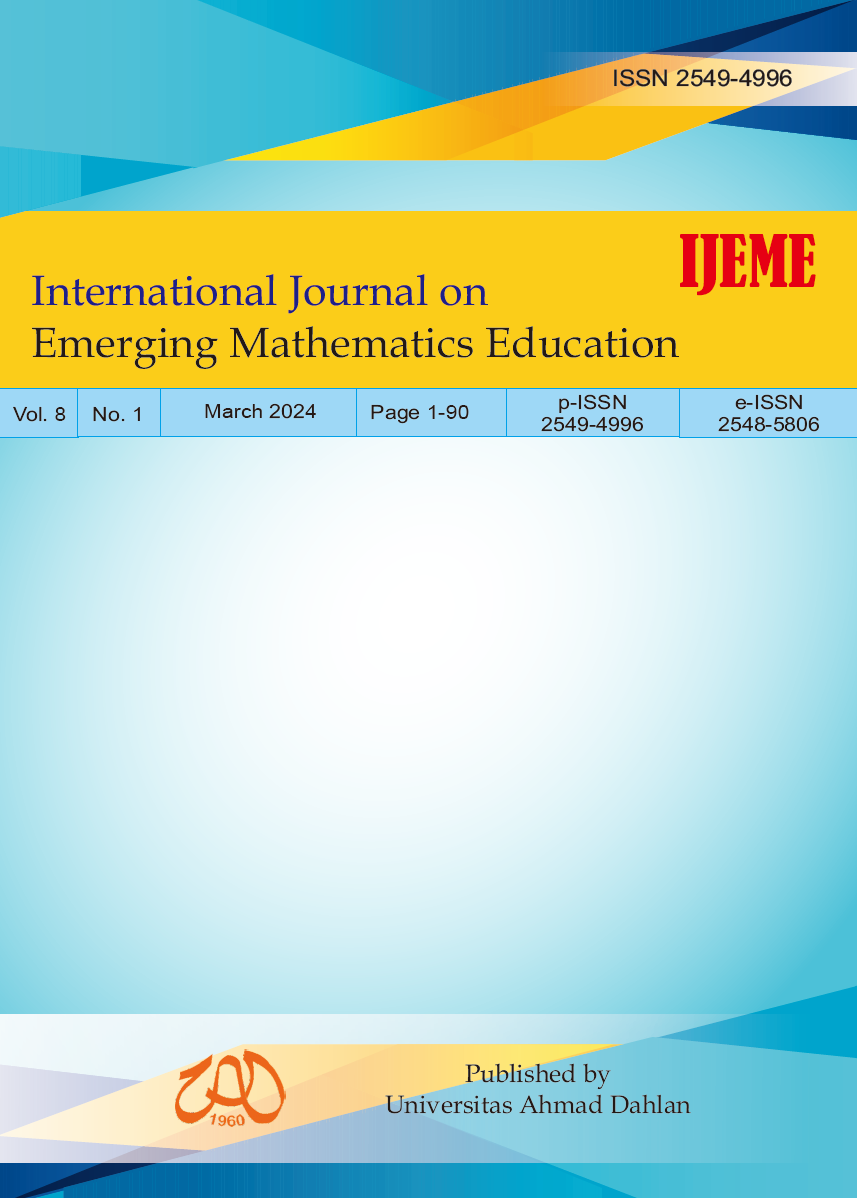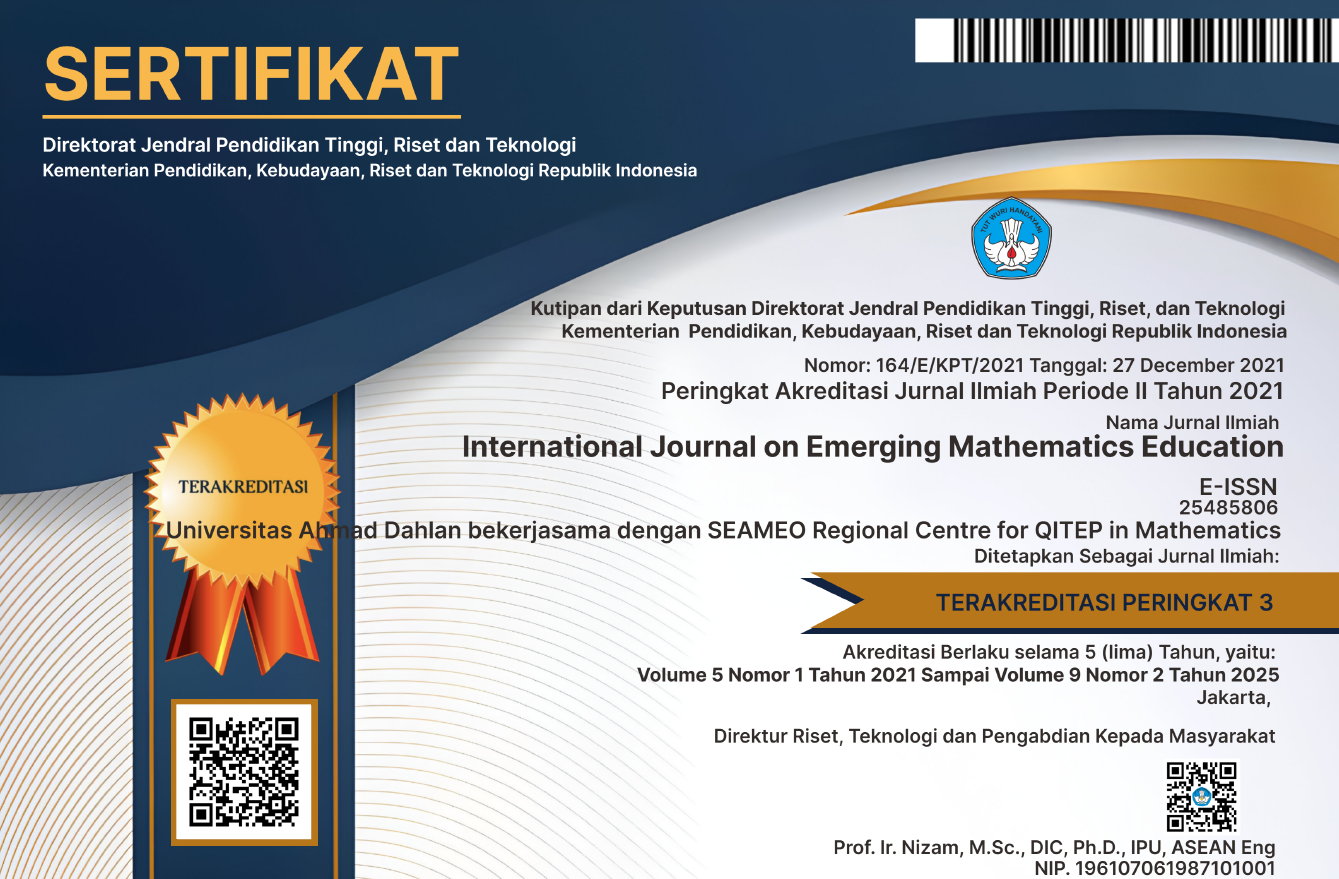Experimentation of Learning Cycle 7E Assisted by Labyrinth Board Game and Putar Bawah Game on Mathematical Reasoning Ability in View of Students' Self-Regulated Learning
DOI:
https://doi.org/10.12928/ijeme.v8i1.28458Keywords:
Learning Cycle 7E assisted by labyrinth board game and putar bawah game, mathematical reasoning ability, self-regulated learningAbstract
This research aims to find out: 1) The learning model that produces better mathematical reasoning ability of students, between the Learning Cycle 7E assisted by labyrinth board game and putar bawah game or direct instruction; 2) The level of students' Self-Regulated Learning that produces bettermathematical reasoning skills, between high, moderate, or low levels of Self-Regulated Learning, ; 3) The interaction learning models and students' Self-Regulated Learning. This research is a quasi experimental research with the subject were VIII grade students of JHS 5 Surakarta in the academicyear 2022/2023 school year. The samples use two classes taken by cluster random sampling. Data collection technique were used documentation, tests, and questionnaires. The data analysis technique used a two-way variance analysis 2×3 unequal cells. The results of the analysis showed that: 1) Learning Cycle 7E learning model assisted by labyrinth board game and putar bawah game resulted is better mathematical reasoning ability than direct instruction; 2) Students with high self-regulated learning had better mathematical reasoning ability than low self-regulated learning; 3) There is no interaction between the learning model and students self-regulated learning.References
Abror, M. H. (2022). Self-Regulated Learning Terhadap Hasil Belajar Matematika Siswa. Plusminus: Jurnal Pendidikan Matematika, 2(2), 233- 242.
Annisa, D. (2022). Pengaruh Model Pembelajaran Learning Cycle terhadap Kemampuan Representasi Matematis. Journal on Education, 4(3), 960-967.
Barnes, A. (2019). Perseverance in mathematical reasoning: the role of children's conative focus in the productive interplay between cognition and affect. Research in Mathematics Education, 21(3), 271-294.
Berg, D H., & Pamela, A. (2018). Differences in mathematical reasoning between Typically achieving and gifted children. Thinking & Reasoning, 30(3), 281- 291.
Budiyono. (2017). Pengantar Metodologi Penelitian. Surakarta: UNS press.
Gulton F.W. & Roesdiana, L. (2019). Analisis Kemampuan Penalaran Matematis Siswa SMP Pada Materi Operasi Aljabar. Prosiding Sesiomadika Seminar Nasional Matematika dan Pendidikan Matematika, 2 (1b), 285-297.
Hadi, Samsul. (2022). Profil Kemampuan Penalaran Matematika dan Potensi Kognitif Siswa MA dalam Menyelesaikan Soal Tes Potensi Skolastik (TPS). Nusra: Jurnal Penelitian dan Ilmu Pendidikan, 3(2), 320-245.
Marliani, S., & Puspitasari, N. (2022). Kemampuan representasi matematis siswa pada materi kesebangunan dan kekongruenan di kampung sukawening. Jurnal Inovasi Pembelajaran Matematika: PowerMathEdu, 1(2), 113-124.
Masfufah, R., & Afriansyah, E. A. (2021). Analisis Kemampuan Literasi Matematis Siswa melalui Soal PISA. Mosharafa: Jurnal Pendidikan Matematika, 10(2), 291-300.
Morsanyi, M., Prado, J., & Richland, L. E. (2018), Editorial: The role of reasoning in mathematical thinking Reasoning & Thinking, 24, 129-137.
NCTM. (2000). Principle And Standard For School Mathematics. USA: The National Council of Teachers of Mathematics, Inc.
Siregar, A. P., Risnawati, & Nurdin, E. (2018). Pengembangan lembar kerja siswa berbasis generative learning model untuk memfasilitasi kemampuan komunikasi matematis siswa sekolah menengah kampar. Jouring (Journal for Research for Mathematics Learning), 1(2), 111- 118
Suardana, I. N., Redhana, I. W., Sudiatmika, A. A., & Selamat, I. N. (2018). Students' critical thinking skills in chemistry learning using local culture-based 7E learning cycle model. International Journal of Instruction, 11(2), 399-412.
Downloads
Published
How to Cite
Issue
Section
License
Copyright (c) 2024 Sutopo Sutopo, Linda Oktavia, Yemi Kuswardi

This work is licensed under a Creative Commons Attribution-ShareAlike 4.0 International License.
License and Copyright Agreement
In submitting the manuscript to the journal, the authors certify that:
- They are authorized by their co-authors to enter into these arrangements.
- The work described has not been formally published before, except in the form of an abstract or as part of a published lecture, review, thesis, or overlay journal. Please also carefully read the International Journal on Emerging Mathematics Education (IJEME) Author Guidelines at http://journal.uad.ac.id/index.php/IJEME/about/submissions#authorGuidelines
- That it is not under consideration for publication elsewhere,
- That its publication has been approved by all the author(s) and by the responsible authorities, tacitly or explicitly, of the institutes where the work has been carried out.
- They secure the right to reproduce any material that has already been published or copyrighted elsewhere.
- They agree to the following license and copyright agreement.
Copyright
Authors who publish with the International Journal on Emerging Mathematics Education (IJEME) agree to the following terms:
- Authors retain copyright and grant the journal the right of first publication with the work simultaneously licensed under a Creative Commons Attribution License (CC BY-SA 4.0) that allows others to share the work with an acknowledgment of the work's authorship and initial publication in this journal.
- Authors are able to enter into separate, additional contractual arrangements for the non-exclusive distribution of the journal's published version of the work (e.g., post it to an institutional repository or publish it in a book), with an acknowledgment of its initial publication in this journal.
- Authors are permitted and encouraged to post their work online (e.g., in institutional repositories or on their website) prior to and during the submission process, as it can lead to productive exchanges, as well as earlier and greater citation of published work.
![]()
Ciptaan disebarluaskan di bawah Lisensi Creative Commons Atribusi-BerbagiSerupa 4.0 Internasional.





